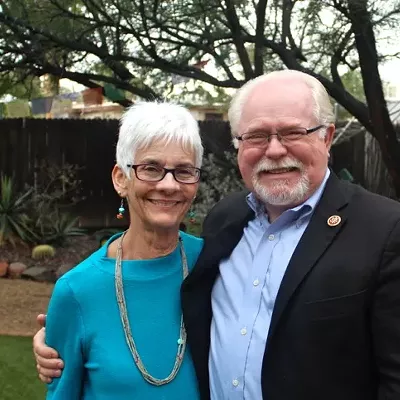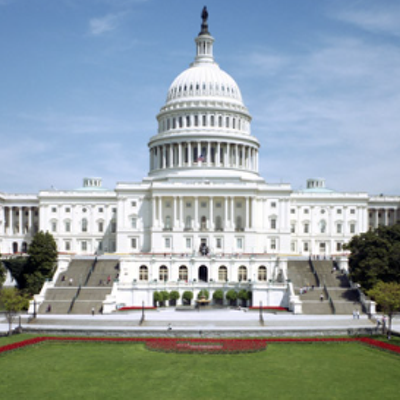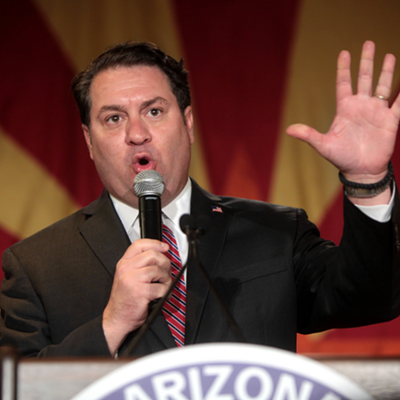CHILD'S PLAY
Gov. Jan Brewer hit the usual notes in her final State of the State address this week: The federal government is bad, Arizona is on the rebound, the state of the state is strong, yadda, yadda, yadda.
She also made a pitch to get tough on human trafficking, provide more subsidies for the tech biz, help families afford higher education by keeping tuition rates steady for university students, invest in infrastructure such as roads and a collection of business tax cuts.
But the big drama was with the announcement she left out of the copy of the advance speech distributed to the press: A call for CPS to be spun off into its own separate government agency instead of being under the control of the Department of Economic Security.
Brewer announced she had already started the process with an executive order moving CPS away from the current DES administration and creating the cabinet-level Child Safety and Family Services Division, which will be run by Charles Flanagan, the boss of the state's juvenile-justice program. She'll need legislative approval to properly attend to all the proper administrative hoo-hah—which she can probably get, given the need for lawmakers to appear to be doing something about CPS after last year's disturbing revelation that more than 6,000 reports to the agency had gone uninvestigated.
Breaking CPS out as a separate agency is a fine idea as far as it goes, but keeping kids out of harm's way in Arizona will require more than a few changes on a flow chart. Working as a CPS caseworker has to be among the worst jobs in the state: The pay ain't great for a job in that requires you to deal with dysfunctional and volatile family situations that are sometimes overshadowed by the threat of violence. The stakes are huge: Taking a kid away from his or her parents is a heart-wrenching decision, especially when there may not be a great place for the kid to land. And CPS resources have grown much scarcer in recent years, although lawmakers did restore some funding in 2013.
Brewer boasted in her speech that she and the Republican leadership had "reined in government spending by consolidating, eliminating and transforming our operations"—which sounds great until you consider that slimmed-down spending means cuts in state subsidies for daycare for single moms who are trying to keep a job and programs such as Healthy Families, which employed social workers who often interceded with families before things spun so far out of control that CPS had to step in.
Those kinds of programs can't keep every family from sliding over the edge—and frankly, no government program can. But early intervention can make a difference in some cases, if you actually care to help children even after they pass the "preborn" stage.
SUPREME REJECTION
The U.S. Supreme Court shot down an appeal by the state of Arizona and let stand an appeals court decision that blocked the state from enforcing a ban on abortions after 20 weeks.
Anti-abortion activists pushed the law at least in part to set up a challenge to Roe v. Wade, the landmark abortion case that paved the way for legal abortion in all 50 states. But the justices did not take the bait and instead, without comment, made it clear that the lower court got it right when it declared the ban after 20 weeks to be unconstitutional.
Bryan Howard, president and CEO of Planned Parenthood Arizona, praised the court's decision but added that "this dangerous and unconstitutional law should never have passed in the legislature in the first place. Politicians in Arizona and in the other 49 states should take note: Dangerous and unconstitutional restrictions on safe and legal abortion will not pass muster in the courts—or with the public."
Howard said the ban on abortions after 20 weeks "would have taken the personal decisions a woman makes in consultation with her doctor, family and faith out of her hands and into the hands of politicians, regardless of her situation or circumstance."
Those politicians are likely to try a new limit this session. State Sen. Kimberly Yee, who sponsored the unconstitutional legislation, declared that the appeals court decision based on longstanding precedent was "dangerous and radical" and promised more legislation was in the works.
"There is no doubt however that today's announcement will not be the last word on this critical issue," Yee said in a statement to the press.
That thought was echoed by Center for Arizona Policy Cathi Herrod, who has complete command of the majority of the GOP lawmakers on the abortion issue.
"For now, in Arizona, we are already taking the next steps to protect women and their preborn children from the dangerous and deadly practices of the abortion industry," Herrod said after the court ruling. "In the coming days we will be announcing new legislation to address this situation."
HEY, BIG SPENDERS
This year's race for governor got a little more interesting last week when Mesa Mayor Scott Smith filed his paperwork for an exploratory campaign.
Smith, who has to go the exploratory route until he decides he wants to resign his mayoral post, is generally seen as a moderate Republican, which sets him apart from the current crop of GOP contenders, which includes Arizona Treasurer Doug Ducey, Secretary of State Ken Bennett, attorney Christine Jones, disbarred attorney Andrew Thomas and state Sen. Al Melvin. There's plenty of room to run to the left of that crowd, although whether it pays to do so in a GOP primary remains to be seen.
If there's one safe prediction about this year's race for governor (besides the absence of action star Steven Seagal as a candidate), it's that more money will be spent than any previous contest.
We got a hint of that last week when Ducey released a peek at his numbers. Ducey, who is considered by many of our GOP sources to be the likely winner of the crowded Republican primary next August, had raised more than a million bucks by the end of 2013 and still had $923,000 in the bank as 2014 began.
Team Ducey made a point of highlighting that the majority of those dollars were raised before the contribution limits were raised from $912 per individual to $4,000 per individual, so he can hit up many of those contributors for more money this year.
Bennett, who is one of Ducey's most viable GOP opponents, is running as a Clean Elections candidate, meaning he'll have just $753,616 in public funds for his campaign provided he qualifies for the program.
One day after Ducey unveiled his fundraising numbers, Democrat Fred DuVal's team took to the Twitter to reveal that he'd already raised more than $800,000 from 2,000 separate donors. Team DuVal made a point of emphasizing that the Democrat does not have to worry about spending any of that money in a primary race.
SO MUCH FOR THAT IDEA
Republican Martha McSally, who hopes to unseat Congressman Ron Barber, caught a break when fellow Republican Ed Martin dropped out of the race.
"As a result of unforeseen personal family challenges that have required and will continue to require my undivided attention, I find it necessary to withdraw from the Republican primary for Congress in CD-02," Martin announced on his website on Friday, Jan. 10.
Although he was an obvious underdog in the Republican primary, Martin was the first choice among Southern Arizona Republicans—mostly in the Tea Party wing of the party—who either distrusted or disliked McSally. Without a significant challenger to the right (and one could still emerge, although sand is running through the hourglass), McSally no longer has to worry about taking hard-right positions through August's primary election that could later hurt her in a general-election match-up against Barber.
Political newcomer Shelley Kais remains in the CD2 Republican primary race.
Find early and late-breaking Skinny at The Range, our daily dispatch at daily.tucsonweekly.com
Jim Nintzel hosts AZ Illustrated Politics, airing at 6:30 p.m. every Friday on PBS 6. This week's guests include Congressman Ron Barber and state lawmakers Ethan Orr and Bruce Wheeler. The program repeats on 12:30 a.m. Saturday.









